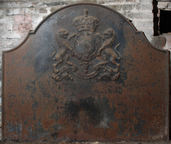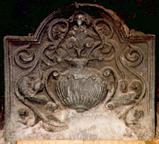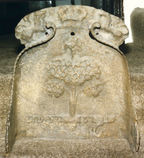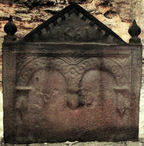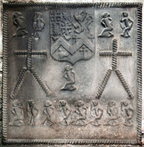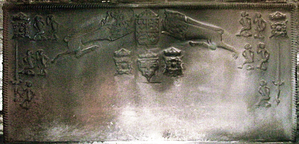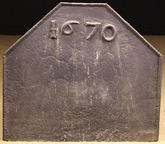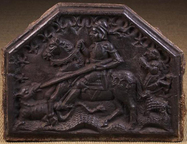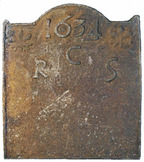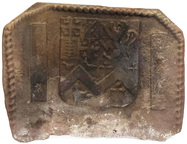-
790
Description: Rectangular with arched rectangular shaped top joined by cavetto curves; astragal edging; shield, supporters, ducal coronet, motto and garter of the Duke of Dorset: Quarterly, Or and gules, a bend vair.
Notes: Almost certainly the arms of Lionel Sackville KG (1688-1765), created first duke of Dorset in 1720; many different firebacks exist, all with precisely the same armorial stamp.
Inscription: [around shield] HONY SOIT QUI MAL Y PENSE / [on motto scroll] AUT NUNQUAM TENTES, AUT PERFICE
Arms: Lionel Sackville, 1st Duke of Dorset
- Decoration tags:
- rectangular with canted top corners and round arch (shape)
- astragal (edging)
- carved pattern panels
- armorial
- text
Manufactured: in the early-18th century in the Weald area of England.
Current location: in private hands, Whatlington, East Sussex, England.
- Attached to series:
- Dorset arms series
- Personal armorial firebacks
- Sackville firebacks
-
791
Description: Arched rectangular shape; cavetto-moulded edging; central, two handled, gadrooned vase with swirled, fruited vines issuing from the neck, and a bird on each side perched within the vines; out of the neck, a naïve human figure with arms outstretched, grasping vines on each side.
Notes: The figure emerging from the vase has a symbolism which has yet to be explained; more than one version of this fireback exists.
Copies of this fireback are known.
- Decoration tags:
- rectangular with round arch (shape)
- cavetto (edging)
- whole carved pattern
- pictorial
- plants
- objects
Manufactured: in the mid- to late-17th century in the Weald area of England.
Current location: in private hands, Ticehurst, East Sussex, England.
- Attached to series:
- Gadrooned vase firebacks
-
1069
Description: Quasi-arched shape with forward-facing 'wings', which splay outwards towards the base where each has been pierced with a small hole as if to insert a rod from one side to the other; the 'wings' curve to follow the shape of the main panel but curl outwards at the top; central panel with stylised tree decoration surmounted with a crown between two inward-facing animals, possibly a lion and unicorn; beneath the tree, a partially illegible inscription in relief.
Notes: Nothing is known about the sources of free-standing firebacks or what prompted their production. Their form is similar and the predominant use of horticultural or arboreal decorative themes suggests production within a limited time frame. Only a very small number of such castings are known. Depth 200mm. A similar fireback, noted at Poynings in Sussex, was illustrated in The Connoisseur, vol 41 (April 1915), p. 221; it too had a crown supported by a lion and unicorn on the top, and a tree with an illegible inscription below.
Inscription: SYLVESTR..[illegible]
- Decoration tags:
- free-standing (shape)
- none (edging)
- whole carved pattern
- text
- plants
Manufactured: in the late-17th to early-18th century in England.
Current location: in private hands, Wigmore, Herefordshire, England.
- Attached to series:
- Free-standing firebacks
-
925
Description: Rectangular panel with moulded edging (top and sides); two joined guilloche arches with bracket ends and floral designs in the spandrels; above, pediment with dentil edging, between teardrop pinnacles; date in bottom centre of pediment; possible initials below and between arches.
Notes: The pattern has been formed from, or in imitation of, the upper part of the back of a joined 'wainscot' chair with an inserted date and possible inserted initials
Inscription: 1661 / [?W] [?H]
- Decoration tags:
- rectangular with triangular arch (shape)
- complex, furniture-derived (edging)
- whole carved pattern
- individual numbers
- architectural
- text
Manufactured: in 1661 in England.
Current location: in private hands, Wigmore, Herefordshire, England.
- Attached to series:
- Chair pattern firebacks
- Furniture stamp firebacks
-
920
Description: Rectangular; twisted rope edging; top centre, quartered shield between four 'imp' figures, left facing, one with right arm raised, one of each on each side; below each pair of figures, a rope cross above an inverted V in rope, with an 'imp' figure, arms lowered, below the shield; along the bottom, eight 'imp' figures, alternately arms raised and lowered.
Notes: The 'imp' figures are common on a group of firebacks, the rope designs having a probable apotropaic significance. The arms are probably of Thomas Wriothesley, who was Henry VIII's last Lord Chancellor and created Earl of Southampton in 1547; he married c.1533 so the arms could date to before then, but the same arms are displayed on his enamelled stall plate in St George's Chapel, Windsor, of 1545, and in stained glass in a window in the parish church at South Warnborough, Hampshire. The shield is, quarterly, 1. Wrythe or Wriothesley quartering Dunstanville and Pink, 2. Drayton, 3. Crocker and 4. Peckham. The same armorial stamp has been noted on at least two other firebacks. A candidate for the earliest English fireback with an example of personal arms.
Arms: Wriothesley (Earl of Southampton)
- Decoration tags:
- rectangular (shape)
- rope (edging)
- simple stamps
- carved stamps
- apotropaic
- armorial
- humans
- objects
Manufactured: in the mid- to late-16th century in the Weald area of England.
Current location: in private hands, Wigmore, Herefordshire, England.
- Attached to series:
- Royal series
- Personal armorial firebacks
- Wriothesley firebacks
-
595
Description: Rectangular; twisted rope edging (top and sides); top centre; crowned Tudor royal shield with angled lion passant guardant sinister to the left, and an angled lion passant to the right; below, a crowned shield with a fleur-de-lys below initials (over-pressed), between two four-petalled, crowned roses; the same crowned rose repeated in each top corner, below each a vertical dagger, point upwards; inside the roses and daggers, two tiered pairs of ‘imp’ figures, one of each with arm raised, above a single figure, its arms lowered.
Notes: Each dagger, which is seen on two other firebacks (no. 660 and no. 1100), is approx. 35cm long.
Copies of this fireback are known.
Inscription: KH
Arms: Tudor royal arms of England
- Decoration tags:
- rectangular (shape)
- rope (edging)
- carved stamps
- heraldic
- armorial
- royal
- animals
- humans
Manufactured: in the mid-16th century in the Weald area of England.
Current location: in private hands, Wigmore, Herefordshire, England.
- Attached to series:
- Royal series
- Knife & Dagger stamp firebacks
-
1020
Description: Canted rectangular shape; twisted rope edging (top and sides); top centre, date formed of individual numerals.
Notes: The '1' has a central button, typical of the period, or of a little earlier. Formerly at Padley Hall, Derbyshire. Wilkinson's, Doncaster, auction 24 Apr 2016 lot 317.
Inscription: 1670
- Decoration tags:
- rectangular with canted top corners (shape)
- rope (edging)
- individual numbers
- text
Manufactured: in 1670 in England.
Current location:, not known.
- Attached to series:
- Date only firebacks
-
1146
Description: Canted rectangular shape; astragal edging with repeated fleurs-de-lys inside top and side edges; figure of St George impaling a dragon to the left with a lance over an undulating ground, with a kneeling figure above a sheep to the right.
Notes: The mould for this unusual fireback may have been formed using a redundant carved, medieval wooden panel, perhaps from a church. Wilkinson's Auctioneers, Doncaster, 24 June 2018, lot 132.
- Decoration tags:
- rectangular with canted top corners (shape)
- astragal (edging)
- whole carved pattern
- pictorial
- mythological
- animals
- humans
Manufactured: in the 16th century in England.
Current location: not known.
- Attached to series:
- Miscellaneous pattern firebacks
-
1055
Description: Arched rectangular shape with small triangular protrusions in each top corner; fillet edging (top and sides); top centre, date stamp, over-pressed on right side; top corners, single fleur-de-lys stamp; below date, initials in triad.
Notes: The fleur-de-lys is of a distinctive form; the small triangular protrusions are not seen on other firebacks. Wilkinson's, Doncaster, auction 26 Feb 2017 lot 272. A fireback with the same date stamp is at Newark Park, Ozleworth, Gloucestershire.
Inscription: 1634 / RCS [triad]
- Decoration tags:
- rectangular with round arch (shape)
- fillet (edging)
- carved stamps
- individual letters
- date stamp
- heraldic
- text
Manufactured: in 1634 in England.
Current location: not known.
- Attached to series:
- 1634 stamp series
-
1305
Description: Quasi-rectangular with canted top corners; twisted rope edging (top and sides); centre top, quartered shield between two vertical carved stamps of a billet with five oval shapes.
Notes: The arms are probably of Thomas Wriothesley, who was Henry VIII's last Lord Chancellor and created Earl of Southampton in 1547; he married c.1533 so the arms could date to before then, but the same arms are displayed on his enamelled stall plate in St George's Chapel, Windsor, of 1545, and in stained glass in a window in the parish church at South Warnborough, Hampshire. The shield is, quarterly, 1. Wrythe or Wriothesley quartering Dunstanville and Pink, 2. Drayton, 3. Crocker and 4. Peckham. A candidate for the earliest English fireback with an example of personal arms. It is possible that this casting is the one formerly at Warnham Court, Sussex, which was illustrated by J. Starkie Gardner in Country Life in 1907. A similar fireback is no. 334. William Smith Auctions, Plainfield, NH, 20 Nov 2024, lot 424 ($250).
Arms: Wriothesley (Earl of Southampton)
- Decoration tags:
- rectangular with canted top corners (shape)
- simple stamps
- carved stamps
- heraldic
- armorial
- objects
Manufactured: in the mid- to late-16th century in the Weald area of England.
Current location: not known.
Citation: Gardner, J. S., 25 May 1907, 'Old Wealden Ironwork at Warnham Court', Country Life, pp. 730-2.
- Attached to series:
- Wriothesley firebacks
- Royal series
- Personal armorial firebacks
